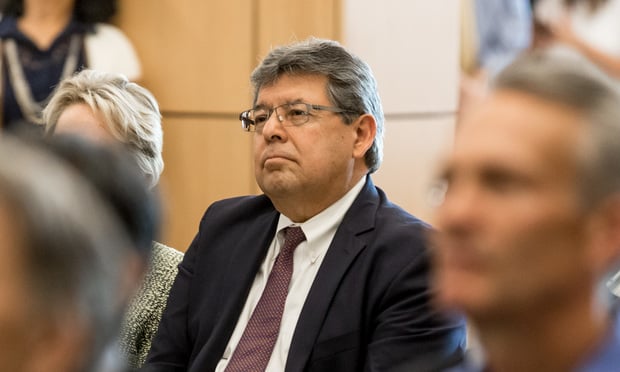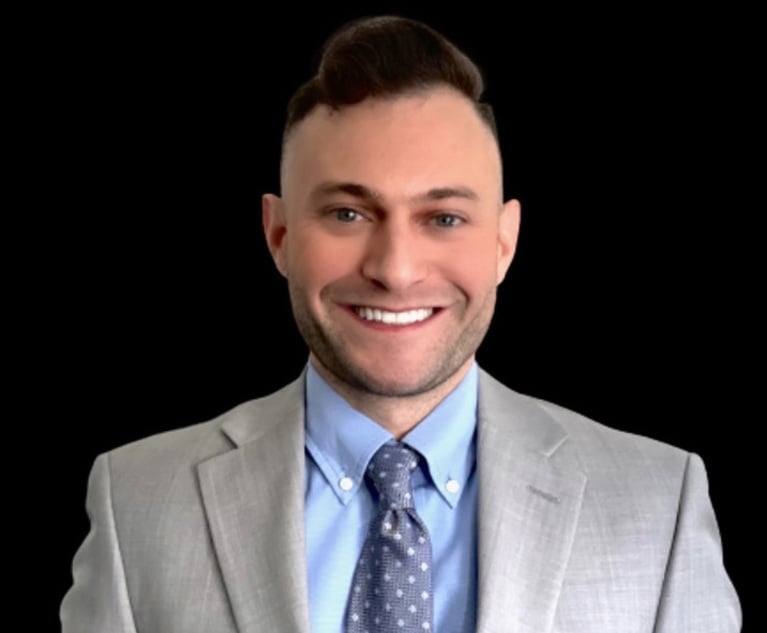Theranos Judge Boots Claims Related to Doctors and Non-Paying Patients, but Lets Most Criminal Charges Proceed
The federal judge overseeing the criminal case against Theranos founder Elizabeth Holmes and the former president of the blood-testing company largely denied their motions to dismiss but found that the government couldn't show that they intended to deprive doctors or insured patients of money since they weren't directly paying for tests.
February 12, 2020 at 03:50 PM
4 minute read
 U.S. District Judge Edward Davila of the Northern District of California watches from the audience as the Charney Hall of Law is dedicated Oct. 12, 2018. Photo: Jason Doiy/ALM
U.S. District Judge Edward Davila of the Northern District of California watches from the audience as the Charney Hall of Law is dedicated Oct. 12, 2018. Photo: Jason Doiy/ALM
The federal judge overseeing the criminal fraud case against Theranos founder Elizabeth Holmes and the blood-testing company's former COO and president, Ramesh Balwani, largely turned back a trio of motions to dismiss the case their defense lawyers filed late last year.
In an order handed down Tuesday evening, U.S. District Judge Edward Davila of the Northern District of California, however, did narrow the government's case by finding that prosecutors would not be able to show that doctors or insured patients were victims of fraud since they weren't directly paying for Theranos' allegedly inconsistent test.
"The contrast between doctors and patients is plain; the [superseding indictment] alleges patients paid while doctors referred," Davila wrote. As to the insured patients, the judge wrote that they "would have paid their premiums regardless of Theranos' blood tests."
A spokesman for the U.S. Attorney's Office for the Northern District of California, which is prosecuting the case, said the office has no comment on the pending litigation.
Davila's ruling largely leaves in place claims that the pair misled investors and patients and that they knew Theranos' blood analyzer could not deliver on the public promises they were making to provide "fast, inexpensive, accurate, and reliable" tests.
Holmes' lawyers at Williams & Connolly asked Davila to dismiss the indictment in court papers filed late last year, claiming that prosecutors failed to allege a single fraudulent statement or misrepresentation made about the now-defunct blood-testing company. The motions, which were joined by Balwani's lawyers at Orrick, Herrington & Sutcliffe, also sought to force the government to provide more detailed information about how it intended to prove the defendants misled investors and customers about the company's blood-testing capacities, its partnership with the Walgreens pharmacy chain, or any need Theranos might have for regulatory approval.
Davila on Tuesday did, in part, grant the defense request related to forcing prosecutors to hand over further details about specific misrepresentations in the advertisements and marketing materials that allegedly misled patients and doctors. However, he held that since defendants made "inflated representations" about Theranos' success and profitability, the government raised viable claims that they needed to tell the "whole truth" about things such as the company's stalling partnership with Walgreens.
"Likewise, by representing their tests as 'accurate' and 'reliable,' defendants had a duty to disclose to doctors and patients that their tests 'consistently' produced wrong results," Davila wrote. "Defendants argument that the Government is 'transforming' the duty to correct asserted half-truths into an independent duty to disclose is thus misplaced."
Orrick's Jeffrey Coopersmith said via email that he had no comment on the ruling. Williams & Connolly's Amy Saharia, who handled the majority of the defense arguments at a Monday hearing on the motions, didn't respond to a message seeking comment.
Read more:
Elizabeth Holmes' Lawyer Assails Theranos Prosecution as 'Massive Case With Undefined Contours'
Theranos Prosecutors: 'Common Sense' Only Thing Needed to Understand Charges Against Holmes
FDA's Top Lawyer Says Theranos Case Places 'Unprecedented' Discovery Strain on Agency
Lawyers for Elizabeth Holmes Make Dismissal Bid in Theranos Criminal Case
This content has been archived. It is available through our partners, LexisNexis® and Bloomberg Law.
To view this content, please continue to their sites.
Not a Lexis Subscriber?
Subscribe Now
Not a Bloomberg Law Subscriber?
Subscribe Now
NOT FOR REPRINT
© 2025 ALM Global, LLC, All Rights Reserved. Request academic re-use from www.copyright.com. All other uses, submit a request to [email protected]. For more information visit Asset & Logo Licensing.
You Might Like
View All
'Pull Back the Curtain': Ex-NFL Players Seek Discovery in Lawsuit Over League's Disability Plan

'Be Comfortable Being Uncomfortable': Pearls of Wisdom From 2024 GC Q&As


Insurers Dodge Sherwin-Williams' Claim for $102M Lead Paint Abatement Payment, State High Court Rules
Law Firms Mentioned
Trending Stories
- 1‘Catholic Charities v. Wisconsin Labor and Industry Review Commission’: Another Consequence of 'Hobby Lobby'?
- 2With DEI Rollbacks, Employment Lawyers See Potential For Targeting Corporate Commitment to Equality
- 3In-House Legal Network The L Suite Acquires Legal E-Learning Platform Luminate+
- 4In Police Shooting Case, Kavanaugh Bleeds Blue and Jackson ‘Very Very Confused’
- 5Trump RTO Mandates Won’t Disrupt Big Law Policies—But Client Expectations Might
Who Got The Work
J. Brugh Lower of Gibbons has entered an appearance for industrial equipment supplier Devco Corporation in a pending trademark infringement lawsuit. The suit, accusing the defendant of selling knock-off Graco products, was filed Dec. 18 in New Jersey District Court by Rivkin Radler on behalf of Graco Inc. and Graco Minnesota. The case, assigned to U.S. District Judge Zahid N. Quraishi, is 3:24-cv-11294, Graco Inc. et al v. Devco Corporation.
Who Got The Work
Rebecca Maller-Stein and Kent A. Yalowitz of Arnold & Porter Kaye Scholer have entered their appearances for Hanaco Venture Capital and its executives, Lior Prosor and David Frankel, in a pending securities lawsuit. The action, filed on Dec. 24 in New York Southern District Court by Zell, Aron & Co. on behalf of Goldeneye Advisors, accuses the defendants of negligently and fraudulently managing the plaintiff's $1 million investment. The case, assigned to U.S. District Judge Vernon S. Broderick, is 1:24-cv-09918, Goldeneye Advisors, LLC v. Hanaco Venture Capital, Ltd. et al.
Who Got The Work
Attorneys from A&O Shearman has stepped in as defense counsel for Toronto-Dominion Bank and other defendants in a pending securities class action. The suit, filed Dec. 11 in New York Southern District Court by Bleichmar Fonti & Auld, accuses the defendants of concealing the bank's 'pervasive' deficiencies in regards to its compliance with the Bank Secrecy Act and the quality of its anti-money laundering controls. The case, assigned to U.S. District Judge Arun Subramanian, is 1:24-cv-09445, Gonzalez v. The Toronto-Dominion Bank et al.
Who Got The Work
Crown Castle International, a Pennsylvania company providing shared communications infrastructure, has turned to Luke D. Wolf of Gordon Rees Scully Mansukhani to fend off a pending breach-of-contract lawsuit. The court action, filed Nov. 25 in Michigan Eastern District Court by Hooper Hathaway PC on behalf of The Town Residences LLC, accuses Crown Castle of failing to transfer approximately $30,000 in utility payments from T-Mobile in breach of a roof-top lease and assignment agreement. The case, assigned to U.S. District Judge Susan K. Declercq, is 2:24-cv-13131, The Town Residences LLC v. T-Mobile US, Inc. et al.
Who Got The Work
Wilfred P. Coronato and Daniel M. Schwartz of McCarter & English have stepped in as defense counsel to Electrolux Home Products Inc. in a pending product liability lawsuit. The court action, filed Nov. 26 in New York Eastern District Court by Poulos Lopiccolo PC and Nagel Rice LLP on behalf of David Stern, alleges that the defendant's refrigerators’ drawers and shelving repeatedly break and fall apart within months after purchase. The case, assigned to U.S. District Judge Joan M. Azrack, is 2:24-cv-08204, Stern v. Electrolux Home Products, Inc.
Featured Firms
Law Offices of Gary Martin Hays & Associates, P.C.
(470) 294-1674
Law Offices of Mark E. Salomone
(857) 444-6468
Smith & Hassler
(713) 739-1250






